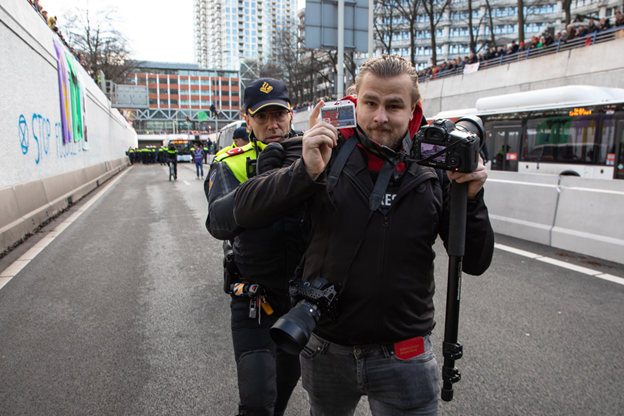Berlin, February 7, 2023 — Dutch authorities should stop harassing, detaining, and removing journalists from protests, and allow them to cover events of public interest without police interference, the Committee to Protect Journalists said Tuesday.
Since January 21, Dutch police have detained two journalists and forcibly removed another while they reported on climate protests, according to multiple news reports and the journalists, who communicated with CPJ via email.
“Dutch authorities should conduct a swift and transparent investigation into the detention and forcible removal of reporters from recent climate protests and ensure that members of the press can report on events of public interest without police interference,” said Attila Mong, CPJ’s Europe representative. “Journalists deserve police officers’ protection during protests, rather than their harassment.”
On January 21, police briefly detained Sara Berkeljon, a reporter for the daily newspaper de Volkskrant, and Renate Beense, a photographer at the outlet, as they reported on climate activists preparing to block the A12 highway in The Hague as part of a demonstration, according to those reports and Berkeljon.
Police arrested the journalists alongside the activists, despite wearing press vests, and fined them 129 euros (US$140) for “using the motorway other than with a motor vehicle.” They were released after a few hours, and Berkeljon said her newspaper would attempt to appeal the fine.
Henriëtte de Wilde, the senior communications officer for the Hague police, told CPJ in an email that Berkeljon and Beense were detained and fined alongside activists for walking on a road prohibited for pedestrians. “Journalists must also follow the instructions of police officers and not commit unnecessary offenses or criminal offenses,” de Wilde said.
Separately, on January 28, police approached Jesper Peeters, a freelance photojournalist working for several Dutch media outlets, while he was photographing climate activists occupying the A12 highway, according to Peeters and those reports.
Despite wearing a press vest and carrying two cameras, Peeters was asked to provide identification and a “riot-card.” The journalist showed his press credentials but said he didn’t know what a riot-card was and attempted to return to work. Police forcibly escorted Peeters from the protest site and warned him against returning.
Peeters said he plans to file a complaint about the officers’ actions.
De Wilde told CPJ that Peeters was removed from the protest location because he “behaved in such a way that he made our colleagues’ work difficult.” When asked about the riot cards, de Wilde said police issue a national police press card that enables journalists to report from areas cordoned off by police.
Police plan to discuss these incidents with the Dutch Association of Journalists (NJV) “with the aim that journalists and the police can do their work in a respectful manner towards each other,” de Wilde said.
[Editors’ Note: This alert was updated to include a response from the Hague police.]
